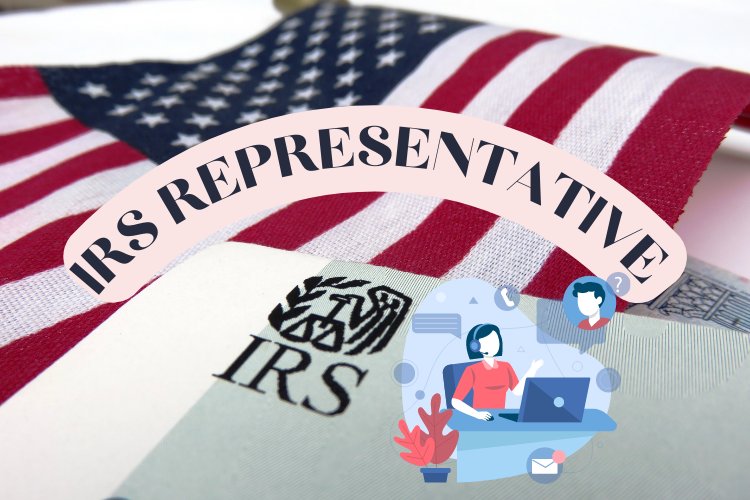IRS representative | How Do I Reach a Real Person at the IRS?
To speak with a live representative at the Internal Revenue Service (IRS), you can call the IRS telephone assistance line at 1-800-829-1040

Live representative IRS ?
To speak with a live representative at the Internal Revenue Service (IRS), you can call the IRS telephone assistance line at 1-800-829-1040. This line is available Monday through Friday from 7:00 a.m. to 7:00 p.m. local time (except on national holidays).
When you call, you will be connected with a representative who can help you with a variety of tax-related issues, including filing your taxes, paying your taxes, and getting a copy of your tax return.
Keep in mind that the IRS telephone assistance line can be very busy, especially during tax season, so you may have to wait on hold for a while before you are connected with a representative. If you are unable to get through to a representative by phone, you can also try contacting the IRS through its website or by mail.
Other ways to contact a real person at the IRS
In addition to calling the IRS telephone assistance line at 1-800-829-1040, there are several other ways you can contact a real person at the Internal Revenue Service (IRS):
1.IRS website: You can visit the IRS website (www.irs.gov) and use the "Contact Us" feature to send a message or request assistance. You may be able to get a response to your question or concern through the website, or you may be provided with additional contact options.

2. IRS mailing address: You can also contact the IRS by mail by sending a letter to the appropriate address for your issue. The IRS has several mailing addresses for different types of inquiries, such as tax returns, payments, and general questions. You can find the correct mailing address for your issue on the IRS website or by calling the IRS telephone assistance line.
3. IRS Taxpayer Advocate Service: If you are experiencing a serious problem with the IRS and have not been able to resolve it through other channels, you can contact the IRS Taxpayer Advocate Service for help. The Taxpayer Advocate Service is an independent organization within the IRS that helps taxpayers resolve problems with the agency. You can reach the Taxpayer Advocate Service by calling 1-877-777-4778 or by visiting the Taxpayer Advocate Service website.
Keep in mind that the IRS telephone assistance line (1-800-829-1040) and the Taxpayer Advocate Service (1-877-777-4778) are both available Monday through Friday from 7:00 a.m. to 7:00 p.m. local time (except on national holidays).
Reasons You Might Need to Contact the IRS
There are many reasons you might need to contact the Internal Revenue Service (IRS), such as:
- Filing your tax return: If you need help with filing your tax return, you can contact the IRS for assistance. This includes help with completing your tax forms, calculating your tax liability, and submitting your return electronically or by mail.
- Paying your taxes: If you owe taxes and need help making a payment, you can contact the IRS for assistance. This includes help with setting up a payment plan, making a payment online or by phone, or paying your taxes by check or money order.

- Getting a copy of your tax return: If you need a copy of your tax return or a transcript of your tax return, you can contact the IRS for assistance.
- Resolving a tax issue: If you have a problem with the IRS, such as a dispute over your tax liability or a problem with your tax account, you can contact the IRS for help resolving the issue.
- Applying for an Individual Taxpayer Identification Number (ITIN): If you are not eligible for a Social Security number but need to file a tax return, you can apply for an ITIN by contacting the IRS.
- Requesting an extension to file your tax return: If you are not able to file your tax return by the deadline, you can request an extension by contacting the IRS.
- Asking a question: If you have a question about your tax return, your tax liability, or any other tax-related issue, you can contact the IRS for help.
How to Prepare for Your Call to the IRS
Here are some tips to help you prepare for your call to the Internal Revenue Service (IRS):
1. Gather your documents: Before you call the IRS, make sure you have all the relevant documents and information on hand. This may include your tax return, any notices or letters you have received from the IRS, and any other documents related to your tax issue.
2. Make a list of questions: If you have specific questions you want to ask the IRS, make a list of them beforehand. This will help you stay organized and ensure that you get all the information you need during your call.
3. Have your personal information ready: When you call the IRS, you will need to provide some basic personal information, such as your name, Social Security number, and tax year. Have this information ready so you can provide it to the representative quickly.
4. Know your account number: If you have an open case with the IRS or have previously filed a tax return, you may have an account number. Having this number on hand can help the IRS representative locate your information more quickly.
5. Be patient: The IRS telephone assistance line can be very busy, especially during tax season. Be prepared to wait on hold for a while before you are connected with a representative.
By following these tips, you can help ensure that your call to the IRS goes as smoothly as possible and that you get the information and assistance you need.
Watch out for IRS phone scams
It's important to be aware that phone scams involving the Internal Revenue Service (IRS) are common, and scammers may try to trick you into giving them personal information or money. Here are some tips to help you avoid IRS phone scams:

- The IRS will never call you to demand immediate payment or ask for your credit card or debit card numbers over the phone.
- The IRS will never threaten to have you arrested or deported if you don't pay a tax debt.
- The IRS will never ask you to pay a tax debt using a prepaid debit card, gift card, or wire transfer.
- The IRS will never ask for your personal or financial information over the phone unless you have previously given them permission to do so.
If you receive a suspicious call from someone claiming to be from the IRS, hang up and report the call to the Treasury Inspector General for Tax Administration (TIGTA) at 1-800-366-4484. You can also report the call to the Federal Trade Commission (FTC) by visiting ftc.gov/complaint. If you are not sure whether a call from the IRS is legitimate, you can contact the IRS directly at 1-800-829-1040 to confirm.
Best Times to Call the IRS
The best times to call the Internal Revenue Service (IRS) may vary depending on the specific issue you are calling about and the level of assistance you need. In general, the IRS telephone assistance line (1-800-829-1040) is open Monday through Friday from 7:00 a.m. to 7:00 p.m. local time (except on national holidays).
Here are a few tips for when to call the IRS:
1. Avoid peak times: The IRS telephone assistance line can be very busy during certain times of the day, such as the early morning and late afternoon. If possible, try to call the IRS during off-peak hours, when wait times may be shorter.
2.Call early in the week: The IRS telephone assistance line may be less busy early in the week, such as on Monday or Tuesday.

3. Plan ahead: If you know you will need to call the IRS about a specific issue, try to plan ahead and make your call as early as possible. This will give you more time to resolve any issues before the tax deadline or other important deadlines.
Keep in mind that the IRS telephone assistance line may be particularly busy during tax season (generally January through April). If you are unable to get through to a representative by phone, you can also try contacting the IRS through its website or by mail.












